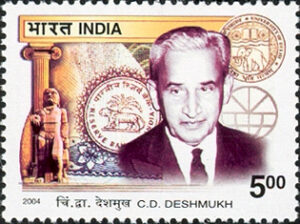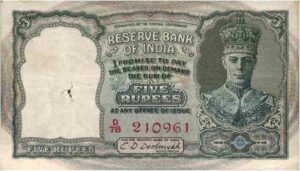Late Chintaman Dwarkanath Deshmukh

Chintaman Deshmukh was born on January 14, 1896 at Nata, near Fort Raigarh, in Maharashtra, in a land-holding family with a tradition of public service. Chintaman’s father, Dwarakanath Ganesh Deshmukh, was a respected lawyer and his mother, Bhagirathibai was a deeply religious lady.
Chintaman Deshmukh had an outstanding educational career. He stood first in the Matriculation examination of the University of Bombay in 1912, and also secured the first Jagannath Sankersett Scholarship in Sanskrit. At the University of Cambridge in 1917, he graduated in the field of Natural Sciences Tripos with Botany, Chemistry and Geology, winning the Frank Smart Prize in Botany. He appeared for the Indian Civil Service Examination, then held only in London, in 1918, and topped the list of successful candidates.
For most of his 21 years with the Indian Civil Service, Chintaman Deshmukh was with the then Central Provinces and Berar Government where, among other things, he was probably the youngest among those who held the positions of Revenue Secretary and Finance Secretary. While on leave in London, he worked as one of the secretaries to the Second Round Table Conference in which Mahatma Gandhi participated. The memorandum submitted by the Central Provinces and Berar Government, which Deshmukh prepared, for the purpose of the enquiry by Sir Otto Niemeyer leading to the award on the financial relations between the Centre and the Provinces under the Government of India Act, 1935, won him high acclaim.
Chintaman Deshmukh’s association with the Reserve Bank of India began in July 1939, when he was appointed Liaison Officer in the Bank to keep the Government of India in touch with the Bank’s affairs. Three months later, he was appointed Secretary of the Central Board of the Bank and two years later in December 1941, as the Deputy Governor. He was Governor from August 11, 1943 to June 30, 1949.

Chintaman Deshmukh proved to be an outstanding Governor. He presided over the transformation of the Reserve Bank from a private shareholders’ bank to a nationalised institution and secured the enactment of a comprehensive legislation for the regulation of banking companies and the establishment of the first financial institution for the provision of long-term credit to industry, namely, the Industrial Finance Corporation of India (IFCI). He also initiated a number of steps for building up an adequate machinery for rural credit. Commenting on Chintaman Deshmukh’s role in regard to the provision of rural credit, a leading co-operator wrote that he “brought about a complete change in the approach from one of hesitant conservatism or laissez-fare to that of a progressive outlook and adoption of positive steps to built up an institutional machinery to provide agricultural credit and for channelling Reserve Bank funds for development of agriculture”.


Chintaman Deshmukh played an important role in the Bretton Woods Conference in July 1944, which lead to the establishment of the International Monetary Fund (IMF) and International Bank for Reconstruction and Development (IBRD). In both of these institutions, Chintaman Deshmukh was a Member of the Board of Governors for ten years and was the Chairman at the Joint Annual Meeting of these two institutions held in Paris in 1950.
In September 1949, the then Prime Minister Jawaharlal Nehru appointed Chintaman Deshmukh as India’s Special Financial Ambassador to America and Europe, in which capacity he conducted the preliminary negotiations for a wheat loan from the USA. Towards the end of the year, Jawaharlal Nehru asked Chintaman Deshmukh to work on the organisation of the Planning Commission and appointed him member of it when it was set up on April 1, 1950. Shortly thereafter, Chintaman Deshmukh joined the Union Cabinet as the Finance Minister and held that office with distinction till he resigned in July 1956. His stewardship of the country’s finances was marked by prudence as well as a humane perspective and vision in dealing imaginatively with the changing financial needs of a developing country. Financial policy was directed towards facilitating the achievement of rapid growth, social justice and economic stability. He made significant contributions to the formulation and implementation of the country’s First and Second Five Year Plans. He was also primarily responsible for such important landmarks in the area of social control of the financial structure such as the enactment of a new Companies Act, and nationalisation of the Imperial Bank of India and life insurance companies.
A different phase of public service by Chintaman Deshmukh in the realms of education and social service was noticed since his Chairmanship of the University Grants Commission from 1956 to 1960, helping to lay a solid foundation for the improvement of the standards of University education in the country. He was Vice-Chancellor the University of Delhi from March 1962 to February 1967, building it up as an outstanding institution for higher learning.
Chintaman Deshmukh also gave generously of his time and energies to the building up of other important institutions devoted to the cause of education and research. He was President of the Indian Statistical Institute (ISI) from 1945 to 1964. It was during the period when he was both the President of the ISI and the Union Finance Minister that the National Sample Survey, to be conducted by the ISI, was instituted (1951-52), and the Central Statistics Office was established. He was President of the Institute of Economic Growth, New Delhi, from 1965 to 1974. He served as the Honorary Chairman of the National Book Trust from 1957 to 1960. He founded the India International Centre in 1959, for which he was the Life President. He headed the Board of Governors of the Administrative Staff College of India, Hyderabad, from 1959 to 1973 and was also the Chairman of the Indian Institute of Public Administration, New Delhi, in 1963-64. Other bodies with which Chintaman Deshmukh was associated included the Indian Council of World Affairs (1960-67) and the United Nations Institute for Training and Research (1965-70). Alongwith his wife Durgabai, Chintaman Deshmukh participated in multifaceted social service work, especially in the functional literacy and family planning work undertaken by the Andhra Mahila Sabha, Madras and Hyderabad, a social organisation of which Smt. Durgabai was the Founder President. He became its President after Smt. Durgabai’s death.
Chintaman Deshmukh’s old college at Cambridge, Jesus College, elected him an Honorary Fellow in 1952 in recognition of his distinguished contribution in the areas of Indian and international finance and administration. He was co-recipient of the Ramon Magsaysay Foundation’s Award for distinguished Government Service in 1959. A number of prestigious universities and institutions, international as well as Indian, conferred on him doctorates honoris causa; these included the Universities of Princeton (USA), Leicester (UK), Pune, Delhi, Allahabad, Nagpur and Osmania (India), as also the Indian Statistical Institute.
Chintaman Deshmukh had a great love for gardening and horticulture was his special hobby. His love for Sanskrit is well known and he published a volume of his poems in Sanskrit in 1969.
He was also proficient in a number of foreign languages.Chintaman Deshmukh died in his 87th year at Hyderabad on October 2, 1982. With his rare combination of qualities of idealism and objectivity, culture and science, integrity, dedication and imagination, Chintaman Deshmukh always ranks high among the eminent sons of India.
